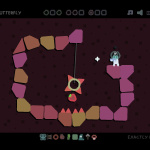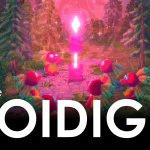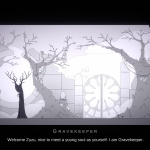The latest art game that’s bubbled out of the internet soup onto my lap is Alexander Ocias’ Loved via Rock, Paper Shotgun, which I… Liked. It’s a little Flash piece about a cold, dysfunctional relationship that is just the right side of disturbing. The game itself is not that difficult – after a couple of playthroughs it no longer serves up a challenge. (If you just fiddle around with it rather than master it, you’re bound to find the jumping and instadeath frustrating.)
In the end it boils down to a simple binary choice on the part of the player, much like Bioshock’s Kiss/Eat Baby “moral dilemma”, although the choice in Loved is not quite as pitch black and angelic white.
But peel away the narrative and graphical novelties and examine what you have left. Loved makes no change to the pot boiler platformer approach: jump, avoid spikes, avoid floating spikes. This isn’t a world away from what I dubbed anti-games, vehicles that are barely a game, offering a story where your actions only control the speed of the pages being turned – or possibly directing which page you end up on. It has added nothing to the Activity component of the game equation, concentrating entirely on the channelling Emotion through story and aesthetic. Like Heir. Like Mighty Jill Off. Like…
Throw yourself into the barbs
There are plenty of examples with more sophisticated elements. Consider the school of platformers based on the idea that the universe is a tool within the player’s control: Eversion (now on sale on Steam), Shift, the bizarre and unsettling Time Fcuk (you might also argue that Specter Spelunker Shrinks belongs in this category). IGF 2010 winner Continuity is a clever sliding tile puzzle that wears the clothes of a platformer. VVVVVV is perhaps the epitome of the genre, carrying just one mechanic as far as it will go. But let’s not forget Braid, the quintessential bloody excellent spin on the world-weary platformer.
The platformer structure goes all the way back to Donkey Kong (Nintendo, 1981) although personally I think the nerve-racking Space Panic (Universal, 1980) laid some of the foundations – and Chris Crawford agrees with me, so there. I still like the platformer model, but what I find interesting is that the counterculture of art games has, at its heart, a willingness to be different, to fight for original ideas. A growing section of gamers have turned their attentions indie-ward as a result, with everyone having their own favourite art game fetish.
And yet we now have 1,001 different ways to play a platformer.
Travel the lower path
So, Loved did something for me, but why? What did I enjoy? I liked its voice. I liked its harsh ambience. I liked the simplicity of its function. I liked the perversity that the game’s apparent disinterest in my welfare made me determined to play through to the end; perhaps a cleverer statement of masochistic love than Mighty Jill Off.
Loved, like other games before it, tells me that if a decent story or strange experience is absorbing, I can overlook a lack of gaming ambition. A narrative, emotional ambition can be enough.
Why is that? And is it really a good thing to encourage developers to churn out the same tired old mechanics with just an artistic spin to differentiate them? Discuss.
Download my FREE eBook on the collapse of indie game prices an accessible and comprehensive explanation of what has happened to the market.
Sign up for the monthly Electron Dance Newsletter and follow on Twitter!











I feel compelled to write about Eversion. That game pissed me off in all the right ways.
Well, tell all, Miles.
I’m preparing a response to your latest & greatest too, by the way. Your long-awaited piece on indie games.
I found Loved to be a wonderful, subtle, and beautiful game. The color blocks of disobedience, for instance, were a lovely and unique mechanic. I don’t want to spoil too much, though, ’cause I’m gonna write about it.
Kent – although perhaps I undersell Loved as doing absolutely naught with the platformer – the little effect you refer to does make the game that much harder. It’s a rather subtle change, but effective.
This is really interesting. I’ve always fallen more into the “context is important” camp, though I remain fascinated by the “the mechanic is the message” hardliners and I think that there is a lot to learn from that kind of paring away of what is often inessential and meaningless.
The moments I loved in Loved were the bits of ambiguity. The “don’t touch the statue” part made me actually cringe before I threw myself down a blind hole without activating the checkpoint first – then the game gave me another checkpoint statue right at the bottom. The way it intentionally abuses you, but then instantly has your back – to me it felt like a great example of the role a designer takes in simultaneously abusing players (for their own pleasure) while at the same time trying their best to care for them. The comparison to Mighty Jill Off, and the statement that game made on game design/game play as a sadomasochistic relationship is very apt, I think.
So I guess it didn’t really bother me that it was mechanically rote, or that the controls were completely awful – the narrative in it worked for me.
Switchbreak: yo, dude.
I’m still not sure where I lie on this particular graph of context vs mechanic, because here I can give up on gameplay and love the narrative. I like the experience and not necessarily the game.
But I can also enjoy a game where the context is absolute bottom of the shoe dog poo, like Dead Space, whose story is uninvolving and a mess (I also tried delving into the comic and animated movie backplot of the game) can succeed on a simple game level. I enjoyed Dead Space immensely. (You might argue that there was a high degree of polish unrelated to gameplay and that counts as context, go on, you might)
I am getting a little tired of meta-gaming statements though. I want [art] games to say more about existence and feeling than what it is to game. I deliberately chose not to see Loved like that (RPS cited it as a game about free will), where the coin and tunnel escape endings were metaphors for the results of your actions, the pat-on-the-back coin feeling more uncomfortable than your tunnel to nowhere.